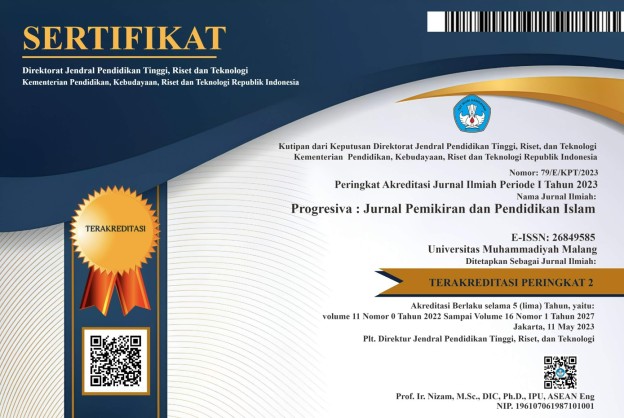Eco-Theology in Islamic Thought: Religious Moderation and Organizational Roles in Mining Management in Indonesia
DOI:
https://doi.org/10.22219/progresiva.v13i03.37102Keywords:
Eco-Theology, Environment, Mining, Religious ModerationAbstract
With the increasing irresponsible exploitation of natural resources, environmental damage has become increasingly concerning, particularly in the mining sector, which has a broad impact on ecosystems and the livelihoods of surrounding communities. The environmental crisis caused by mining activities in Indonesia demands a new approach to more sustainable resource management. This study aims to explore the role of religious moderation from the perspective of eco-theology, which has the potential to offer solutions for natural resource management. Eco-theology provides spiritual principles that can be integrated into environmental policies, creating a balance between economic interests, ecology, and societal well-being. This research is a literature review employing a descriptive analysis method. The results show that eco-theology offers a relevant framework for shifting the paradigm of mining management from anthropocentrism to ecocentrism. Religious organizations have great potential to promote sustainable mining management by incorporating spiritual values into environmental practices. Religious moderation serves as a foundational pillar in strengthening ecological awareness, improving the relationship between humans and nature, and encouraging sustainable development aligned with religious principles.
Downloads
References
Aditama, A., Muthohirin, N., & Rafliyanto, M. (2023). Analyzing Ecotheology from The Perspective of Islam and Christianity. Progresiva : Jurnal Pemikiran Dan Pendidikan Islam, 12(01), 131–152. https://doi.org/10.22219/progresiva.v12i01.27291
Ali, A., & Muhdlor, A. Z. (2013). Kamus kontemporer Arab-Indonesia. Multi Karya Grafika.
Anitasari, S. D. (2024). Menelisik Kerusakan Lingkungan Akibat Tambang Timah. Detiknews. https://news.detik.com/kolom/d-7304555/menelisik-kerusakan-lingkungan-akibat-tambang-timah
Berger, P. L. (2010). Kabar Angin dari Langit: Makna Teologi dalam Masyarakat Modern. LP3ES.
Borrong, R. P. (2019). Kronik Ekoteologi: Berteologi Dalam Konteks Krisis Lingkungan. Stulos: Jurnal Teologi, 17(2). https://doi.org/http://jurnalstulos.sttb.ac.id/
Consuelo. (2013). Pengantar Metode Penelitian. UI Press.
Darajat, Z. (2017). Muhammadiyah dan NU: Penjaga Moderatisme Islam di Indonesia. Hayula: Indonesian Journal of Multidisciplinary Islamic Studies, 1(1), 81–96. https://doi.org/10.21009/hayula.001.1.05
Douglas Crow, K. (2015). Consuming Islam: Branding “Wholesome” As Lifestyle Fetish. Islamic Sciences, 13(1).
Fealy, G. (2018). Consuming Islam: Commodified Religion and Aspirational Pietism in Contemporary Indonesia. In Expressing Islam (pp. 15–39). ISEAS Publishing. https://doi.org/10.1355/9789812308528-006
Fios, F. (2013). Eko-Spiritualisme: Sebuah Keniscayaan pada Era Kontemporer. Humaniora, 4(2), 12–37. https://doi.org/10.21512/humaniora.v4i2.3567
Herlina, N. (2021). Environmental Problems and Environmental Law Enforcement in Indonesia. Galuh Justisi Scientific Journal, 3(2), 162–178. https://doi.org/10.25157/jigj.v3i2.93
Hidayatulloh, T., Meghatruh, D. D., & Saumantri, T. (2023). Konsumerisme Beragama di Era Digital: Analisis Paradigma Postmodernisme Jean Baudrillard Terhadap Fenomena Beragama Umat Islam di Indonesia. Islamadina : Jurnal Pemikiran Islam, 24(2), 273–288. https://doi.org/https://jurnalnasional.ump.ac.id/index.php/ISLAMADINA/article/view/14961
Ilyas, M. (2018). Environment in Islamic View. Journal of Social Humanities, 1(2), 102–115. https://doi.org/10.12962/j24433527.v1i2.672
Indonesia, C. (2024). Aturan Lengkap Jokowi soal Izin Kelola Tambang untuk Ormas Keagamaan. Www.Cnnindonesia.Com. https://www.cnnindonesia.com/nasional/20240602083649-20-1104772/aturan-lengkap-jokowi-soal-izin-kelola-tambang-untuk-ormas-keagamaan
Iswanto, A. (2017). The Ideology and Transmission of Religious Literature in Da’wah Activists and Islamic Studies in ITB Bandung. Jurnal Smart (Studi Masyarakat, Religi, Dan Tradisi), 3(1), 13–26. https://doi.org/10.18784/smart.v3i1.424
Kalia, S. (2023). Consuming Islam: media, ritual, and identity in the making of a brotherhood. Religion, State and Society, 51(2), 194–212. https://doi.org/10.1080/09637494.2023.2197843
Klimova, S. (2020). The Rise of the Philosophy of Life. In Russian Intelligentsia in Search of an Identity (pp. 103–153). BRILL. https://doi.org/10.1163/9789004440623_005
Linge, A. (2017). Filantropi Islam Sebagai Instrumen Keadilan Ekonomi. Jurnal Perspektif Ekonomi Darussalam, 1(2), 154–171. https://doi.org/10.24815/jped.v1i2.6551
Makmur, M., Kamaruddin, K., & Yusra, Y. (2021). Muslim Teachers Perspectives on Students Hedonism Behaviors. International Journal of Contemporary Islamic Education, 3(1), 102–122. https://doi.org/10.24239/ijcied.Vol3.Iss1.34
Mardhiah, I., Aulia, R. N., & Narulita, S. (2014a). Konsep Gerakan Ekoteologi Islam Studi Atas Ormas NU Dan Muhammadiyyah. Jurnal Studi Al-Qur’an, 10(1). https://doi.org/https://journal.unj.ac.id/unj/index.php/jsq/article/view/4420
Mardhiah, I., Aulia, R. N., & Narulita, S. (2014b). Konsep Gerakan Ekoteologi Islam Studi Atas Ormas NU Dan Muhammadiyyah. Jurnal Studi Al-Qur’an, 10(1). https://doi.org/https://garuda.kemdikbud.go.id/documents/detail/1908615
May, S., Wilson, E. K., Baumgart-Ochse, C., & Sheikh, F. (2014). The Religious as Political and the Political as Religious: Globalisation, Post-Secularism and the Shifting Boundaries of the Sacred. Politics, Religion & Ideology, 15(3), 331–346. https://doi.org/10.1080/21567689.2014.948526
Miles, M. B., Huberman, A. M., & Saldaña, J. (2014). Qualitative data analysis: a methods sourcebook. In Third Edition. Sage Publications inc.
Mufid, M. (2020). Green Fatwas in Bahtsul Masāil: Nahdlatul Ulama’s Response to the Discourse on the Environmental Crisis in Indonesia. Al-Ihkam: Journal of Law & Social Institutions, 15(2), 173–200. https://doi.org/10.19105/al-lhkam.v15i2.3956
Mustofa, I. P. (2023). Peran Muhammadiyah dalam Gerakan Lingkungan Hidup. Https://Tajdid.Id. https://tajdid.id/2023/01/10/peran-muhammadiyah-dalam-gerakan-lingkungan-hidup/
Nasikhin, N., Raaharjo, R., & Nasikhin, N. (2022). Moderasi Beragama Nahdlatul Ulama dan Muhammadiyah dalam Konsep Islam Nusantara dan Islam Berkemajuan. Islamic Review: Jurnal Riset Dan Kajian Keislaman, 11(1), 19–34. https://doi.org/10.35878/islamicreview.v11i1.371
Nasr, S. H. (1976). Man and Nature: The Spritual Crisis of Modern Man. Mandala Books.
Nasr, S. H. (2004). The Encounter of Man and Nature. University of California Pres.
Ngabalin, M. (2020). Ekoteologi : Tinjauan Teologi Terhadap Keselamatan Lingkungan Hidup. Caraka: Jurnal Teologi Biblika Dan Praktika, 1(2). https://doi.org/https://ojs.sttibc.ac.id/index.php/ibc/article/view/22/0
Permadi, I., Samudra, R. J., Utomo, Y. R. P., & Hidayati, D. M. (2022). Al maun and climate crisis: Dynamic between Muhammadiyah and indigenous communities in 21th century. Jurnal Ilmu Dakwah, 42(1), 95–110. https://doi.org/10.21580/jid.v42.1.11216
Ramadhan, M. (2019). Maqasid Syari’ah dan Lingkungan Hidup (Bahtsul Masa’il Sebagai Perlawanan Kaum Santri Terhadap Eksploitasi Pertambangan Emas di Silo Jember). Journal Analytica Islamica, 8(2). https://doi.org/http://dx.doi.org/10.30829/jai.v8i2.7076
Redaksi, T. (2024). Alasan Muhammadiyah Akhirnya Terima Izin Tambang Ormas Keagamaan. CNBC Indonesia. https://www.cnbcindonesia.com/news/20240727100348-4-558085/alasan-muhammadiyah-akhirnya-terima-izin-tambang-ormas-keagamaan
Restu Aulad Al-Fattaah, Iqbal, M., & Rusydi, M. (2023). Interaksi Sufisme, Ekologi dan Teologi di Era Postmodernisme: Antara wahdat al-wujûd Ibn ‘Arabi dan sûluk al-Ghazali. Al-Banjari: Jurnal Ilmiah Ilmu-Ilmu Keislaman, 22(1). https://doi.org/https://dx.doi.org/10.18592/al-banjari.v22i1.7671
Ridwanuddin, P. (2017). Ekoteologi Dalam Pemikiran Badiuzzaman Said Nursi. LENTERA: Jurnal Ilmu Dakwah Dan Komunikasi, 1(01). https://doi.org/10.21093/lentera.v1i01.832
Ritzer, G. (2010). Teori Sosial Postmodern. Kreasi Wacana.
Sandiah, F. A. (2022). Risalah Islam Berkemajuan untuk Krisis Ekologi. Muhammadiyah.or.Id. https://muhammadiyah.or.id/2023/08/risalah-islam-berkemajuan-untuk-krisis-ekologi/
Saumantri, T. (2022). Konstruksi Nilai-Nilai Moderasi Beragama dalam Perspektif Filsafat Agama. Substantia: Jurnal Ilmu-Ilmu Ushuluddin, 24(2), 164. https://doi.org/10.22373/substantia.v24i2.14854
Saumantri, T. (2023). Hyper Religiusitas di Era Digital: Analisis Paradigma Postmodernisme Jean Baudrillard Terhadap Fenomena Keberagamaan di Media Sosial. Al-Mutharahah: Jurnal Penelitian Dan Kajian Sosial Keagamaan, 20(1), 107–123. https://doi.org/https://doi.org/10.46781/al-mutharahah.v20i1.646
Setiawan, V. N. (2024). 2 Ormas Keagamaan Terbesar RI Akhirnya Terima IUP Tambang dari Jokowi. CNBC Indonesia. https://www.cnbcindonesia.com/news/20240725231805-4-557735/2-ormas-keagamaan-terbesar-ri-akhirnya-terima-iup-tambang-dari-jokowi
Stark, R. (2017). Toward a Theory of Religion: Religious Commitment. Routledge.
Sukarna, R. M. (2022). Human and Environment Interaction in The Perspective of Anthropocentrism, Anthropogeography and Ecocentrism. Tropical Journal, 16(1), 84–100. https://doi.org/10.36873/jht.v16i1.2969
Widiyanto, A. (2017). Traditional science and scientia sacra: Origin and dimensions of Seyyed Hossein Nasr’s concept of science. Intellectual Discourse, 25(1), 18–32. https://doi.org/https://doi.org/10.31436/id.v25i1.1000
Yafie, A. (2016). Merintis fiqh lingkungan hidup. Yayasan Amanah.
Zulkayandri, Z. (2017). Concept of Ihsan ’Izz Al-Din Ibn Abd Al-Salam. Al-Fikra: Islamic Scientific Journal, 4(1), 29. https://doi.org/10.24014/af.v4i1.3750
Published
How to Cite
Issue
Section
License
Copyright (c) 2024 Taufik Hidayatulloh, Theguh Saumantri

This work is licensed under a Creative Commons Attribution-ShareAlike 4.0 International License.

















